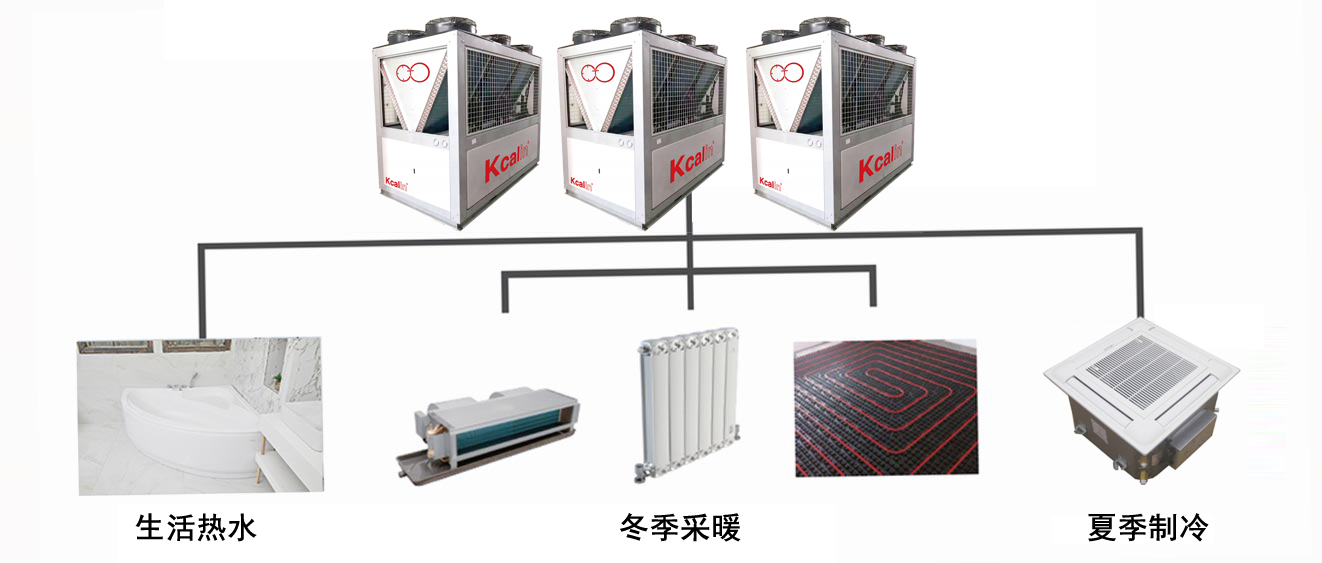In the era of pursuing environmental protection and energy efficiency, air energy heat pump heating systems have become a highly anticipated HVAC equipment. This system, with its zero emissions and high efficiency, provides sustainable and environmentally friendly heating solutions for homes and commercial spaces.
Working principle of air energy heat pump heating system
Heat absorption process: The center of gravity of the air energy heat pump heating system is the cycle process of heat absorption and release. The system absorbs low-temperature heat from the air through an outdoor evaporator, evaporates the low-temperature working fluid (refrigerant) into gas, and absorbs heat from the environment.
Compression heating: The evaporated gas is compressed through the compressor, which increases the temperature and pressure of the gas. This heating process transforms the working fluid into a high-temperature and high-pressure gas.
Heat release process: High temperature and high pressure gases release heat through the indoor evaporator, transferring the heat to the indoor heating or hot water system, thereby achieving heating of the indoor space.
Expansion and cooling: After the heat release process, the working fluid becomes a low-temperature and low-pressure liquid. At this point, the liquid rapidly expands through the expansion valve, reducing temperature and pressure, and entering the heat absorption process again.

The environmental advantages of zero emissions
Electric energy drive: The air energy heat pump heating system uses electricity as the power source. Compared to traditional gas heating systems, it does not produce direct emissions and reduces the burden on the environment.
Renewable energy matching: If renewable energy is used for power generation, such as solar or wind energy, the air energy heat pump system will achieve zero emissions. The environmental friendliness of the system lies in its integration with renewable energy.
Energy saving characteristics of high efficiency
Thermal energy recovery: The air energy heat pump heating system effectively utilizes the heat released by evaporation and compression through thermal energy recovery technology, improving the overall thermal energy utilization efficiency of the system.
Widely applicable: Due to its working principle, air energy heat pump systems do not rely on geothermal resources, so they can be applied in most areas. Even in cold winter, with excellent technology, the system can still operate efficiently.
The operational stability of the system
Adaptive control: The adaptive control system enables the air energy heat pump heating system to automatically adjust operating parameters according to actual environmental conditions, ensuring efficient and stable operation of the system under different climate conditions.
Low noise design: The design of air energy heat pump systems focuses on reducing noise and improving user comfort. The low-noise operation of outdoor units not only ensures the quality of life for users, but also reduces environmental noise pollution.
User experience and future prospects
Comfortable experience: The air energy heat pump heating system not only provides a uniform and warm indoor environment, but also has refrigeration function, making it a universal hot water heating system throughout the year.
Future development: With the continuous advancement of technology, air energy heat pump heating systems will become more intelligent and efficient. The application of new materials and technologies will further improve the performance of the system, bringing users a more convenient, economical, and environmentally friendly heating experience.
The air energy heat pump heating system has become a green leader in the modern HVAC field due to its zero emissions and high efficiency. By delving into the working principle of the air energy heat pump heating system, we can better appreciate its excellent performance in environmental protection, energy conservation, comfort, and other aspects. In the future, air energy heat pump systems are expected to continue to play a crucial role in the field of heating technology, helping society move towards a more sustainable future.







Comment